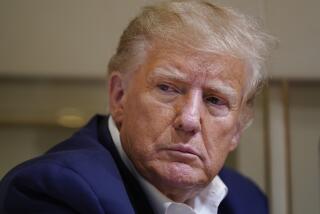Believes It Confirms He Didn’t Know of Fund Diversion : Reagan Views Report as Favorable
- Share via
WASHINGTON — President Reagan views the Senate report on the Iran- contras arms affair as confirmation that he was unaware of the diversion of funds to the Nicaraguan rebels, his spokesman said Friday.
But White House spokesman Larry Speakes, referring to one of the most sensitive aspects of the operation, acknowledged that the sale of weapons and spare parts to Iran could be seen--wrongly, in his view--as an effort to obtain the freedom of Americans held in Lebanon in exchange for the arms.
Hostage Link Discounted
“The linking of arms sales to the release of hostages at several points during this 15-month episode could be interpreted as a trade of arms for hostages, but this was not the policy approved by the President,” Speakes said.
The release of the report, prepared by the Senate Intelligence Committee, offered the White House something for which it had been hoping: a document, prepared by an independent body, that portrayed the President as having no knowledge of the most politically embarrassing element of the operation--the transfer to the contras of money derived from the sale of arms to Iran.
However, it contains a number of informal indictments of Administration actions in its portrayal of deceitful conduct among senior officials, its accounts of efforts to raise funds for the anti-Sandinista rebels and its questions about the weight given by Reagan to the freeing of the hostages in connection with the arms sales.
Better Iran Relations
The President has maintained that the main purpose of the operation was to improve relations with strategically important Iran, contending that the freedom of the hostages was only a secondary goal.
But, in a reference to Lt. Col. Oliver L. North, who was fired from his post on the National Security Council staff when the diversion of the funds became known, the report says:
“North said that, when he spoke with the President, it was in terms of a strategic linkage. With the President, said North, it always came back to hostages. According to (Atty. Gen. Edwin) Meese, North said it was a terrible mistake to say that the President wanted a strategic relationship, because the President wanted the hostages.”
In responding to this, Speakes said that North took part in 17 meetings with Reagan, “none of which included a very small group at all.”
“That recollection of Ollie’s does not necessarily hold water because Ollie was never in any private, intimate conversations with the President,” the spokesman said.
Speakes said in a statement that “the President is pleased” the report was issued. “It confirms his position that he neither authorized nor was aware of the alleged transfer of funds to the contras,” the White House spokesman said.
However, the committee did not hear from North or Vice Adm. John M. Poindexter, who was Reagan’s national security adviser until he resigned as a result of the Iran-contras affair. Poindexter and North refused to testify before the committee, citing the Fifth Amendment right against self-incrimination.
Reagan to Read Report
Speakes said also that Reagan had been given a copy of the report and would read it.
Meanwhile, Vice President George Bush, in a speech to a conference on law and society sponsored by the conservative Federalist Society, criticized the way Congress has taken an “increasing and influential role in the day-to-day micromanagement of foreign policy.”
“Congress, through its use of law, rather than the executive’s traditional tools of diplomacy and negotiation, has ushered the courts and lawyers into an uncomfortable but very visible role in the development of our foreign policy,” he said.
“I don’t believe that the founders (of the nation) intended that our foreign policy should be conducted or reviewed by grand juries. I don’t believe that the founders anticipated or intended judicial intervention into foreign policy,” he said.
Grand Jury Impaneled
Bush’s remarks appeared to be critical of the role of Lawrence E. Walsh, the independent counsel named to investigate the Iran-contras affair, who this week impaneled a grand jury. But Stephen Hart, a spokesman for Bush, said the vice president intended no reference “to any specific grand jury.”
Instead, Bush was said by an aide to be focusing on “Congress’ use of law, rather than the executive branch’s traditional tools of diplomacy and negotiation,” in foreign affairs.
In addition, the vice president reiterated a suggestion that, if Congress replaced its current House and Senate intelligence committees with one oversight panel, covert activities could be “confined to the Central Intelligence Agency, subject to appropriately disciplined executive and legislative oversight based on mutual trust, not complicated regulations that frustrate the development of the trust.”
This was a reference to the requirements that Congress be notified quickly of most covert operations.
More to Read
Sign up for Essential California
The most important California stories and recommendations in your inbox every morning.
You may occasionally receive promotional content from the Los Angeles Times.









